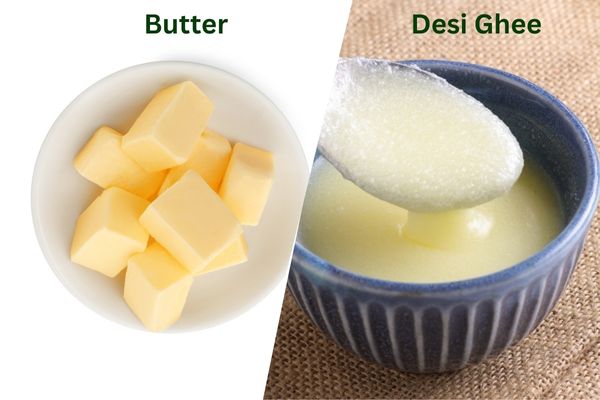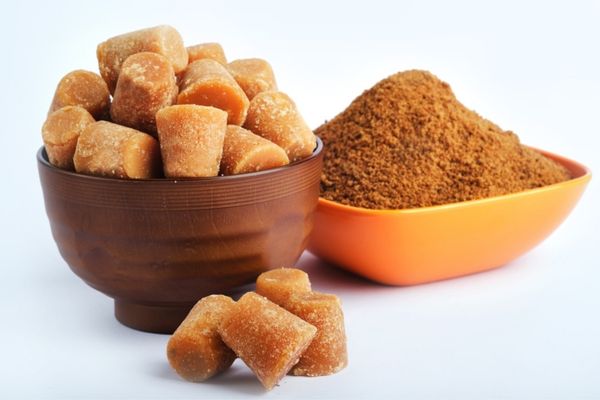Cooking oils and fats play a crucial role in our diet, influencing both our health and the flavor of our food. Among the most debated choices are desi ghee vs olive oil, both of which have unique benefits. But which one is the best oil for Indian cooking? In this article, we'll explore the nutritional differences, health benefits, smoke points, impact on heart health, weight management, digestion, and best use cases of each. By the end, you'll have a clearer idea of which oil suits your needs best.

Nutritional Differences: Desi Ghee vs. Olive Oil
Both desi ghee and olive oil contain healthy fats, but their compositions vary significantly:
|
Nutrients |
Desi Ghee (per 100g) |
Olive Oil (per 100g) |
|
Calories |
900 kcal |
884 kcal |
|
Total Fat |
99.8g |
100g |
|
Saturated Fat |
62g |
14g |
|
Monounsaturated Fat |
28g |
73g |
|
Polyunsaturated Fat |
4g |
11g |
|
Omega-3 |
Minimal |
1% |
|
Omega-6 |
Small amounts |
8% |
|
Vitamins |
A, D, E, K |
Vitamin E |
-
Desi Ghee is high in saturated fats but also contains fat-soluble vitamins (A, D, E, K), which are essential for overall health.
-
Olive Oil is rich in monounsaturated fats (MUFA), particularly oleic acid, which is linked to heart health and anti-inflammatory benefits.
Health Benefits of Desi Ghee
1. Good for Digestion
Desi ghee contains butyric acid, which supports gut health and improves digestion. It also helps relieve constipation and promotes a healthy gut microbiome.
2. Boosts Immunity
With its rich vitamin content, ghee strengthens the immune system, aiding in faster recovery from illnesses.
3. Great for Brain Health
Ayurveda suggests that ghee nourishes the brain, improving memory and cognitive functions.
4. Enhances Skin and Hair
The healthy fats in ghee contribute to glowing skin and shiny hair by keeping them moisturized from within.
5. Supports Joint Health
Ghee’s anti-inflammatory properties make it beneficial for those suffering from joint pain and arthritis.
Health Benefits of Olive Oil
1. Protects Heart Health
Olive oil is high in monounsaturated fats and antioxidants like polyphenols, which help reduce bad cholesterol (LDL) and increase good cholesterol (HDL), lowering the risk of heart disease.
2. Supports Weight Management
The MUFAs in olive oil keep you satiated, reducing overall calorie intake and aiding in weight management.
3. Anti-Inflammatory Properties
The antioxidants in olive oil help fight inflammation, potentially lowering the risk of chronic diseases like arthritis and Alzheimer's.
4. Improves Skin and Hair Health
Olive oil hydrates the skin, fights signs of aging, and nourishes hair, making it shinier and healthier.
5. Aids in Diabetes Control
Studies suggest that olive oil can help regulate blood sugar levels, making it a good choice for diabetics.
Smoke Point: Which One is Better for Cooking?
The smoke point of an oil determines how suitable it is for different cooking methods:
|
Oil Type |
Smoke Point |
Suitable Cooking Methods |
|
Desi Ghee |
250°C |
Deep frying, sautéing, baking |
|
Olive Oil (Extra Virgin) |
190°C |
Salad dressing, low-heat cooking |
|
Olive Oil (Regular) |
220°C |
Light frying, roasting |
-
Desi Ghee has a high smoke point (250°C), making it ideal for deep frying and traditional Indian cooking.
-
Extra virgin olive oil (EVOO) has a lower smoke point (190°C), which means it’s best for salads, dips, and light sautéing.
-
Regular olive oil (220°C) is suitable for roasting and stir-frying.
Impact on Heart Health
-
Desi Ghee: Previously linked to heart disease due to high saturated fat, but recent studies suggest moderate consumption of ghee can improve HDL (good cholesterol) levels.
-
Olive Oil: Proven to improve cardiovascular health due to its high MUFA and antioxidant content, making it the better choice for heart patients.
Which Is Better for Weight Management?
-
Desi Ghee: Though calorie-dense, ghee contains CLA (Conjugated Linoleic Acid), which may help reduce fat mass.
-
Olive Oil: Contains healthy fats that support metabolism and help in weight management.
-
Verdict: If consumed in moderation, both can aid in weight loss, but olive oil is generally recommended for those on a calorie-restricted diet.
Best Uses in Cooking
When to Use Desi Ghee?
✔️ Best for Indian cooking (parathas, dal tadka, curries) ✔️ Great for deep frying and high-heat cooking ✔️ Can be used in baking and bulletproof coffee
When to Use Olive Oil?
✔️ Ideal for salad dressings and dips ✔️ Best for light sautéing and grilling ✔️ Used in Mediterranean cuisine (pasta, hummus, roasted vegetables)
Expert Recommendations
-
If you cook Indian food daily, use desi ghee in moderation for its authentic flavor and high smoke point.
-
If your diet is more Mediterranean or weight-focused, opt for olive oil for its heart-healthy benefits.
-
Consider using both oils strategically—ghee for high-heat cooking and olive oil for cold applications.
FAQs
1. Can I use olive oil for Indian cooking?
Yes, but avoid extra virgin olive oil for deep frying as it has a lower smoke point. Use regular olive oil instead.
2. Is ghee healthier than butter?
Yes, ghee has a higher smoke point, is lactose-free, and contains beneficial nutrients.
3. Can I use both desi ghee and olive oil?
Absolutely! Use ghee for traditional Indian cooking and olive oil for Mediterranean dishes or salads.
4. Which is better for cholesterol control?
Olive oil is better for heart health as it helps reduce LDL cholesterol and increase HDL levels.
5. Can ghee or olive oil help in weight loss?
Both can support weight management when used in moderation as part of a balanced diet.
Conclusion: Which One Should You Choose?
Both desi ghee and olive oil have unique benefits, making them essential in a well-rounded diet. If your cooking involves high-heat frying and Indian flavors, ghee is the better choice. If you’re looking for heart-healthy fats and weight management, olive oil is ideal. The best approach? Use both in moderation based on your cooking needs!
Looking for more health tips? Subscribe to our newsletter for expert guidance on healthy eating!











